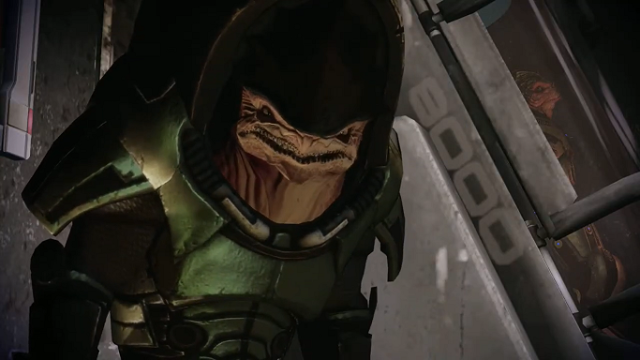In an early mission In Mass Effect 2, Shepard is sent to recruit a krogan scientist named Okeer. He’s been cloning simple-minded krogan soldiers for a human mercenary to use as cheap cannon fodder, but Shepard discovers he’s been using this to fund and develop his own response to the genophage. As any Mass Effect fan knows, the genophage is a virus dropped on the krogan to drastically control their population; the krogan homeworld is a violent and dangerous place that shaped their biology and worldview, and once uplifted and able to move about a more peaceful and safe galaxy, they began violently colonising and warring with everyone and everything. The genophage affected their fertility so that only one in one thousand births were viable, stopping the krogan from overwhelming everyone with sheer numbers. Krogan have taken this as a severe blow to their sense of glory; some have turned to desperate measures to cure the genophage while most have become nihilistic and bitter.
Okeer explains his plan and philosophy to Shepard: genetically engineer one single perfect example of krogan values. One way Mass Effect works fantastically as a story with a vast imaginative setting is that we see the same stories playing out a million times with a million entirely different protagonists and thus a million different endings; the krogan story is defined largely by the search for glory through conflict, and the genophage is a culture-wide obstacle to that. Krogan glory is usually short-term and individual, with most krogan Shepard meets being violent badasses but krogan society as a whole being in decline. One of Shepard’s dearest comrades is Wrex, a krogan whose highest priority is community organisation to make krogans glorious as a species – defeating the genophage through teamwork and stronger institutions. Okeer’s plan is nearly unique: to focus not on increasing numbers but on making each remaining krogan one hundred times more powerful than they were before. He sums up his philosophy thus: “I will give the genophage the greatest insult an enemy can suffer: to be ignored!”
This is interesting for two reasons. The first is that this romanticises the idea of picking your battles. Krogan spend some of their time defining glory and conflict and much more of it chasing it; Wrex begins the story cynical and dismissive of his people because they spend so much of their time preoccupied with petty squabbles and personal ego when there are larger issues at stake; he tells the story of trying to organise a few clans into a larger unit, only for it to immediately descend into backstabbing that led him to kill his own father. There’s also the large number of krogan who live to get revenge on the universe simply out of spite; if I must be fucked over for no real reason, then I shall fuck over everyone in turn.
Okeer, conversely, has defined glory very specifically and recognised that not only is it still possible, it’s still plausible. The line between backing down from a conflict out of cowardice and not engaging with it out of intelligence is very fine but very visible: is this actually an obstacle to my goal? There is something intoxicatingly empowering about recognising that someone is beneath you. To look at what you actually want to do (rather than how you want to be perceived) and recognise that some flailing idiot frothing at the mouth is completely unable to prevent that, and that engaging with them will be more inconvenient to you than letting them be wrong. It’s fun to just stand back and watch someone who has no idea what situation they’re actually in. Okeer observed his world and said: just because the quantity of glorious krogans has fallen doesn’t mean the quality of krogan glory is diminished.
The second reason this scene is interesting is because Okeer is a man in a hostile time. He wants glory when his people are in a time of nihilism and pessimism with absolutely no systemic support for his ideals, and rather than wallowing in self-pity or anger, he has let it fuel his creativity. There’s a ridiculous notion that conflict breeds creativity; I think it’s far more accurate to say that conflict on its own breeds systemisation, in that you are forced to use what you know with close to 100% certainty works and throw out what doesn’t. What actually breeds creativity is an inability to identify with the times you are in. I think of Robert Eggers not only flatly rejecting the notion of setting one of his films in the modern day, but identifying more with an earlier time in filmmaking. I think of Bob Dylan being unable to identify with almost any time he’s been in. Hell, I think of my own writing here – inspired by critics who were obscure when they were working and have vanished from the face of the earth, who I channel into my current works.
Believing in a glorious golden age (usually in the long past but sometimes in the present) is absolutely worthless if you’re seeking truth, whether objective or moral. At worst, you’ll ignore or paper over things you don’t want to hear; at best you’ll find yourself in a perpetual state of unsurprised disappointment, which is a feeling as addictive as it is unhealthy. On the other hand, if you have the attitude of a creative – the desire to see something in the world that wasn’t there before – then nostalgia is an absolute necessity and a world with no heroes is a huge plus, because it means you’re the one who gets to step up. In Okeer’s case, he bends the universe in a few simple ways to produce krogan murdering the shit out of their enemies. Nostalgia gives you the actions you need to move forward.


